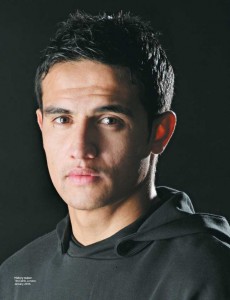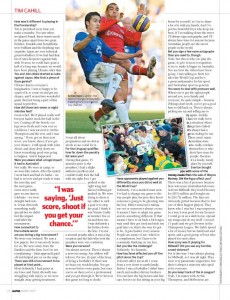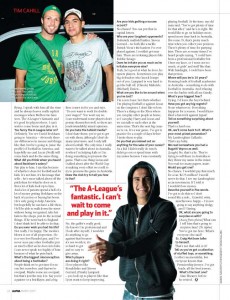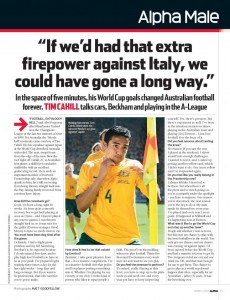 Tim Cahill
Tim Cahill
Exhibit A: your stock-standard Q&A, this one with the Australia and Everton star Cahill. I did this one for Alpha magazine in about 2007, not long after Australia’s semi-successful World Cup campaign, with Guus Hiddink as manager.
_________
“Football, eh? Bloody hell,” said Alex Ferguson after Manchester United won the Champions League in the last two minutes of time in 1999. For Australia, the “bloody hell” moments came courtesy of Tim Cahill. His late equaliser against Japan at the World Cup drenched Australia with relief. The next, swept home from the edge of the area, blew the roof right off. Cahill, 27, is Australia’s best player, a skilful yet combative midfielder with an excellent goalscoring record. He is such an important member of Everton’s Premiership side, that when Alpha speaks to him, he’s still recovering from being thrown straight back into the fray, having barely recovered from a serious knee injury.
Good. It’s been a long eight-10 weeks. It’s been quite a smooth recovery, but to get back playing as soon as I have – and I haven’t played any reserve games. I was thrown straight back in, so it was nice for the gaffer (Everton manager David Moyes) to have so much trust in me.
You must have been dog tired after the game.
Definitely. I had a slight groin problem and my left hamstring. But that’s to be expected because I’d only trained four days, and to play high-level football you have to be at your peak. I’ve prepared right, training three times a day for the last eight weeks – long days and long evenings. But if you want to be professional, that’s the sacrifice you’ve got to make.
How does it feel to be that valued by Everton?
Fantastic. I take great pleasure from that – it’s a massive compliment. I’m at a massive football club that prides itself on players putting everything into it. Whether I’m playing for my country or my club, I’m the kind of person who likes to repay people’s faith. The proof’s in the pudding when you play football. Thirty-five thousand Evertonians every week turn out and want to see you play.
Do you feel the pressure to perform?
It’s mixed, really. Playing at this level, you have to step up to the plate week in and week out, and every year you have to keep improving yourself. Yes, there’s pressure, but there’s enjoyment as well. I’ve been in the situation numerous times, playing in the Australian team and playing [for] Everton – I just love football, love the buzz of it.
 Did you feel nervous about testing the knee?
Did you feel nervous about testing the knee?
No chance. If you saw the way I played at the weekend, I threw myself into enough challenges. I wanted to test it, and I ended up getting another yellow card, which I didn’t want to do. One more yellow and I’m suspended again.
Do you feel like you really belong in the Premiership now?
I always felt like I deserved to be there, but when there’s all the press and so much going on, you’re constantly under the spotlight – you have to impress. One season you’re star-struck, the next season you’re the boy to do it. My stats speak for themselves: every year I’ve played and every year I score goals. It happened at Millwall and it’s happening now at Everton.
What was it like to go the World Cup and step up another level?
People ask whether I was nervous, but this was my chance to play with the best footballers in the world. You only get one chance and my chance was coming on against Japan. I’d been injured before the World Cup and had a massive recovery to get fit. Two surgeons ruled me out and one ruled me OK, and that was enough for me to get there. The chance to get to play in a world cup doesn’t happen that often, especially for an Australian – [after] 35 years. It was the best thing ever.
How was it different to playing in the Premiership?
You’re punished every time you make a mistake. You saw when we played Brazil, there wasn’t much in the game apart from two great finishes. Ronaldo and Ronaldinho were brilliant and the finishing was exquisite. Japan are very technical, great footballers. If we had had that bit of extra firepower against Italy with 10 men, we could have gone a hell of a long way, because we would have been playing Ukraine after that.
 You and John Aloisi started as subs against Japan. Was that a piece of Guus genius?
You and John Aloisi started as subs against Japan. Was that a piece of Guus genius?
I’ll leave that to everyone’s imagination. I was so happy to be a part of it, to come on and get my chance, and I scored two wonderful goals. But just being a part of this squad is priceless.
How did those last seven or eight minutes feel?
Great relief. We’d played really well but just hadn’t stuck the ball in the net. Coming off the bench, our legs were fresh and I was ever so confident. I was sat next to Archie Thompson and the rest, and I was saying, “If you get on there just score, you know, shoot, if you get your chance. I still speak with John Aloisi, and deep deep down we knew something good was going to happen. And it happened.
Were you aware what a huge impact it had in Australia?
Not really. We were in camp, so we were like robots. After the match I went back and had ice baths – we had to recover and get ready to train the next day, and the next game. Guus never really gave us any time to celebrate – we were straight back into it. It was obviously something really special but we didn’t feel the impact until after the tournament.
How connected to the outside world are you during a big tournament?
We were very isolated. We saw a few papers, but it was much better for us. We were away from the families and the fans, but I’m not complaining – [that approach] paid off and helped put us on the map.
There was still a tournament to be played at that point…
Most definitely. I had pains in my knee and Harry (Kewell) was struggling with injury, so we were straight away getting treatment. It was all about preparation and we did as much as we could for it.
For the Uruguay qualifier, how far down the penalty list were you?
During that game, 15 minutes prior to the penalties, I had a slight adductor problem and couldn’t really kick the ball with my right foot. I got pushed to the right wing and Jason (Cullina) got pushed in. We were trying to shore it up, either to nick a goal or to stop the goal. I think it was Vinnie Grella at number five or six and then me. I was definitely a bit further down the line. I’m not a normal penalty taker, it was a big occasion and the lads who took the penalties were very confident.
Were you nervous?
I’m always nervous. There’s always a nervous energy. Any athlete will tell you. For me, it’s part of the buzz of being a footballer. If there was no buzz you wouldn’t play. You get nervous before every game, but once you’re on there you’re a professional and you get through it. We’ve been in this game too long to choke.
Have opponents played against you differently since you did so well at the World Cup?
Definitely. I’m a marked man now. I’ve had to change my game to the way people play, because they know someone’s going to be ghosting into the box. Either someone’s taking me out or someone’s always on me. It means I have to adapt my game and do something different. If that means I have to sit back a bit longer, wait until they get tired and nick my goal later on, that’s the way it’s got to be. It gets harder every season. People are aware of me, which is a compliment, but I have to be constantly thinking on my feet.
But you like the challenge?
Definitely. It’s fantastic.
How has fame affected you off the pitch since the Cup?
It doesn’t affect me at all. I come from a very down-to-earth family. Before I was a footballer I didn’t have much and neither did my brothers. You can have the big houses and fast cars, but it’s no fun sitting in your big house by yourself, so I try to share a lot of it with my family. And I’ve got two beautiful boys who keep me busy. If I’m walking down the street I’ll always sign autographs, and I’ll always have time for anyone because Australian people are the nicest people in the world.
Bet you sign a few more autographs than you used to, though.
Yeah, but this is why you play the game, to give it more recognition, to try to make it bigger in Australia. You see how the Ashes have been going. I was talking to Brett Lee after the World Cup and he’s a great ambassador for his sport and Australian sport in general.
You seem to deal with pressure well.
When you’ve got the right people around you, your family and everyone, it’s quite simple – because if things don’t work, you’ve got a good base to fall back on. They’re always picking me up and telling me to try again. Luckily, I haven’t really been in a situation where things have failed; it’s always had a great ending for me. There aren’t many Australian stars who really outclass themselves or who don’t have time for people. Because it’s a lonely, lonely place by yourself.
Everton bought you with some of the money made from the sale of Wayne Rooney. Did the hype affect you?
There was a bit of pressure because here was some Australian kid come in from Millwall; they’d sold Rooney for [$57] million and bought me for [$3.75] million. The fans are obviously gutted because they’ve lost one of their biggest players. They knew who I was but I was unproven. In a way it was good for me because I could go in as a dark horse, spread my wings and do my stuff. I scored 13 goals and we got Everton in the Champions League. We didn’t spend a lot of money but we had heart and spirit, and a good group of boys who played for each other.
How scary was it playing for Millwall? Did you see any terrible crowd violence?
Put it this way: I was always playing for Millwall, so I was all right. They were very passionate supporters, but there’s always a minority who spoil it for everyone.
Do you keep track of the A-League?
Yeah, I’m mates with Archie Thompson, and Melbourne are flying. I speak with him all the time and he always leaves really explicit messages when Melbourne have won. The A-League’s fantastic and it’s good for players there. I can’t wait to come home and play in it.
You fancy the A-League later on?
Definitely. You see David Beckham going to America – obviously there are differences in money and things like that, but he’s going to [raise the profile] of football in America, and hopefully me and Lucas (Neill) will come back and do the same thing.
What did you think when you heard about Beckham’s salary?
Fair play to him. I say that because of what he’s done for football and for kids. It’s not him, it’s his image that sells – he’s more talked about off the pitch than for what he does on it. But a lot of kids look up to him. And a lot of parents spend a hell of a lot of money getting Beckham on the back of a jersey or buying his boots. He’s only going to help America, but hopefully he can have a life there. He’ll be able to walk down the street without being recognised, take his kids to the shops, just do the normal things. If he went back to England I don’t think he’d be able to do that.
Do you ever wish you had his life?
Not really, I’m happy. The media’s blown it out of all proportion. He is a very level-headed guy, and I’ve never seen any other footballer put as much effort as he does into kids. I can never speak too highly of him because of what he puts back.
What’s the biggest misconception about being a footballer?
People think we’ve got time for no one but ourselves, and that we’re overpaid. Maybe some are overpaid, but that’s just the way it is. Say you’re a painter or a bricklayer, and a big firm comes in for you and says, “Do you want to work for double your wages?” You won’t say no. I can understand some players don’t portray themselves well, so there are [understandably] mixed opinions.
Do you hate the tabloid media?
I don’t hate them; you’ve got to get on with them, although I don’t do many interviews, and I only talk about football. The only time I really want to be talked about in Australia is when I’m helping kids or I’m doing something to promote the game. That’s one thing Lucas and I talked about after the World Cup is making every effort we could to try to promote the game in Australia.
Does the club try to tell you how to live?
No, the gaffer’s really good. He knows I’m professional and I look after myself. I wouldn’t do anything to go against that because it’s not worth it; it’s so hard to get and so easy to give away.
Which players are doing it right?
I love players like Ronaldinho and Steven Gerrard, (Frank) Lampard – you look up to players like that. I just want to keep improving.
Are your kids getting a scouse accent?
No chance! You can put that in capital letters.
Who are your toughest opponents?
Definitely midfield battles. Steven Gerrard – we both like a tackle. Patrick Viera’s the hardest I’ve ever played against. I couldn’t get near him. There are irritating players like Robbie Savage.
Does he irritate you as much as he irritates everyone else?
Yeah, he’s good at what he does, he upsets players. Sometimes you play big defenders who knock lumps out of you. Lampard is very hard to get the ball off. (Claude) Makelele, (Michael) Essien…
What are you like to be around when you’ve lost?
I’m a sore loser, but that’s whether I’m playing football or against Lucas on the computer. I don’t like to lose. There’s a thing on the Xbox where you can play other people at home, so I can play Harry and Lucas and we can talk to each other at the same time. That’s the next big craze we’re on. It’s a war game. I’ve got to practice for a couple of days before I invite them to play.
Do you feel you missed out on anything for the sake of your career?
As a kid I didn’t really do much, didn’t go out or spend time with my mates because I was constantly playing football. At the time, my old man said, “You’ve got plenty of time for that after,” and he’s so right. We would like to go on holidays more, spend more time back in Australia. But come 35, that’s pretty much time when you collect your pension. There’s plenty of time for partying later. There are so many times I’ve heard people saying, “I could have been a professional footballer but I hurt my knee, or I went out too much, or girls” and stuff like that. With hindsight, I could have been that person.
Where will you be in 10 years?
Running loads of football academies in Australia – something to do with football in Australia. And relaxing over the barbie with all my family.
What’s your biggest fear?
Dying. I’d leave the boys behind.
Have you got any big regrets?
None whatsoever. Everything happens for a reason. I would have liked a hat-trick against Japan!
Tell us something surprising about yourself.
That’s a hard one.
OK, we’ll come back to it. What’s your most prized possession?
My Lamborghini Gallardo. That’s my baby.
We read somewhere you had a Bugatti Veyron as well.
[Laughs] No, that’s a lie. They’re trying to sell them in Australia so they threw my name in the mixer. You read too many papers, mate.
Would you get one?
No chance. I wouldn’t pay that much for a car. $2.75 million? I would never do that. I see my Lamborghini as an investment. If I sold it I wouldn’t lose money.
Describe yourself in five words.
I’ve got to do this so I don’t sound like a nob… Grateful, witty, mischievous, happy – I’m not going to say anything dodgy, am I? Daring.
OK, what are you going to surprise us with?
[Away from phone] What can I tell him that’s going to surprise him? [To Alpha] You’ve got me here. What’s everyone else said?
Er, Craig Mottram talks to himself.
That’s not that odd, is it?
Tell us you’ve got a collection of stuffed toys, or something.
I collect memorabilia, but everyone knows that. Premiership jerseys. I’ve got loads, all the best jerseys.
What’s the best one?
Alan Shearer, before he retired.
_________
See this as PDFs:
